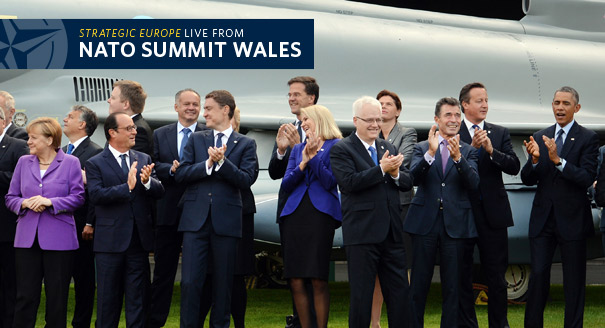The NATO summit of September 4–5 was a strange one. Leaving aside the appalling transportation logistics, the agenda shifted during the first day. Some countries’ expectations were met, others’ were not. And the leaders who were keen to give regular briefings were few and far between.
As for the agenda, the radical Islamist movement known as the Islamic State crept onto the list of discussion items at an astonishing speed. U.S. President Barack Obama and British Prime Minister David Cameron made sure that would happen when they published a joint op-ed in several European newspapers. The two leaders had to be seen to be doing something after the jihadist group beheaded two U.S. journalists.
Obama and Cameron achieved what they wanted from the summit: the makings of a coalition of the willing to confront the Islamic State.
The ten nations in the coalition are the United States, Britain, France, Germany, Canada, Australia, Turkey, Italy, Poland, and Denmark. So far, there are no Arab participants.
Kerry insisted that the coalition would not be sending troops to Iraq. “We need to attack [the Islamists] in ways that prevent them from taking over territory, to bolster the Iraqi security forces and others in the region who are prepared to take them on, without committing troops,” he said. “Obviously, I think that’s a redline for everybody here: no boots on the ground.” (Even mentioning redlines is not a good idea: many have been crossed during the Syria crisis.)
The focus on the Islamic State was surely a welcome distraction for Russian President Vladimir Putin, as many observers had expected the Wales meeting to concentrate on Russia’s incursion into eastern Ukraine.
So while Poland and the Baltic states had hoped that this summit would be their crowning achievement for bringing NATO back to heavy-duty territorial defense, they had to compete with the ever-deepening crisis in the Middle East.
It’s interesting that Warsaw has agreed to sign on to Kerry’s coalition of the willing, given Poland’s preoccupation with the Ukraine crisis and its determination to focus on how to counter Russia’s growing belligerence in eastern Ukraine.
Indeed, Poland did not get what it wanted from the Wales summit. For several months, Poland, together with the Baltics, had wanted NATO countries to agree to deploy troops on the ground on a permanent basis. At one stage, Radek Sikorski, the Polish foreign minister, had sought a battalion of 10,000 soldiers to be based in Poland. This was not to be: the big Western European countries and the United States opposed the idea for financial and political reasons.
In the end, a detailed plan for troop deployments, new bases (including one in Szczecin in northern Poland), and a rapid reaction force seems to have convinced the Poles that they achieved as much as they were going to get. Germany will be heavily involved in forging much closer military cooperation with Poland and a cluster of other countries.
“We value very highly the fact that there is progress in increasing the level of NATO readiness to create a spearhead, including assigned forces that comprise around 5,000 troops for absolutely immediate reaction,” Bronisław Komorowski, the Polish president, told reporters.
As grumbling journalists entered a second hour of waiting on September 4 for transportation to take the media back from the summit venue to Cardiff, one Polish colleague quipped: “We’ve still to be admitted to the ranks of NATO’s first class despite all we’ve done for them.” He hadn’t heard that his country would be hosting the next NATO summit in 2016!
NATO’s Southern European members managed to squeeze something out of the Wales summit by keeping their distance.
The Spanish, Portuguese, and Greek governments must have been relieved that Obama and his new coalition will do their bidding in Iraq. And they have been let off the hook when it comes to boosting the defenses of Poland and the Baltic states. The Southern Europeans just don’t perceive Russia as a threat. It will be interesting to see whether they sign on quickly to the rapid reaction force.
Finally, NATO made some gestures toward those countries wanting to join the organization. Georgia, which few NATO members seem to want in the alliance, will be offered “enhanced opportunities,” said NATO Secretary General Anders Fogh Rasmussen. “This reflects the progress Georgia has made in its relationship with NATO,” he added. The alliance will also strengthen its partnerships with Jordan and Moldova.
Talks will open on whether the Western Balkan country of Montenegro should join NATO. But the leaders of another Southeast European nation, Macedonia, return home empty-handed as ever because of Greece’s veto over the country’s future name. Despite that, Rasmussen said that “no third country has a veto on enlargement.”
As for Obama, after his fiery speech on transatlantic ties on September 3 in Estonia, he must have been relieved that the two big crises dominating the NATO summit meant that the U.S. pivot to Asia rarely surfaced.







